
THE VOICE OF INTERNATIONAL LITHUANIA
|
VilNews has its own Google archive! Type a word in the above search box to find any article.
You can also follow us on Facebook. We have two different pages. Click to open and join.
|
Archive for October, 2015
- Posted by - (0) Comment
|
Musicians on Cathedral Square |
- Bookmark :
- Digg
- del.icio.us
- Stumbleupon
- Redit it
EU-Russia: Facing a new reality
- Posted by - (3) Comment
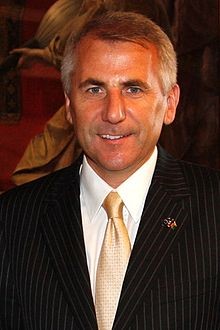
By Vygaudas Ušackas
EU Ambassador to the Russian Federation
Dear readers of VilNews,
It’s great to see this online resource for people interested in Baltic affairs. I congratulate the editors. From my position as EU Ambassador to Russia, allow me to share some observations.
For a number of years, the EU and Russia had assumed the existence of a strategic partnership, based on the convergence of values, economic integration and increasingly open markets and a modernisation agenda for society.
Our agenda was positive and ambitious. We looked at Russia as a country ready to converge with “European values”, a country likely to embrace both the basic principles of democratic government and a liberal concept of the world order. It was believed this would bring our relations to a new level, covering the whole spectrum of the EU’s strategic relationship with Russia.
In such an environment, Europe’s security architecture, which had been built and maintained for decades – and which the Baltic States are a part of – was seriously undermined by Russia’s illegal annexation of Crimea, followed by the destabilisation of Eastern Ukraine. Our relations became a hostage to the situation in Ukraine.
Rather than coming closer and nurturing the same values, a divide gradually developed between us.
Over the last two years, the quality of EU-Russia relations has been determined neither by our strong mutual interests nor by a common vision, but mainly by our divergence over Ukraine. We have been running the very real and grave risk of falling into the trap of long-term strategic rivalry and competition. We have seen an enlarged rift in our world views and, by extension, in our relationship. This is a very dangerous development. Whether talking about the Eastern Partnership, civil society, human rights, the Maidan, economic policy or sanctions, we have been seeing things differently. It seems that we have been living in a world of misperceptions and delusions.
The Baltic States have a particularly crucial part to play. Acting as a role model and remaining open for contacts and engagements with the Russian society at large, they should reinforce the immunity of our society from political corruption and media manipulation, and keep the socio-economic model strong and attractive. So it is time for solidarity, and I’m happy that we are now enjoying the benefits of the Euro-Atlantic institutions. As the EU is of prime importance in economy, so is NATO for security. NATO and the EU mutually reinforce one another.
Areas of common interest
But of course, the EU and Russia are indispensable international actors. We are interdependent on a wide range of bilateral and multilateral issues, be they trade, energy or global matters, which remind us of the need to agree on common efforts. The Iranian nuclear talks are a good example, where diplomacy in the P5+1 format managed to produce a landmark agreement.
Regarding trade, the EU remains Russia’s main trading partner and its main customer, absorbing nearly half of Russian exports. The EU is by far the largest source of Foreign Direct Investment (FDI) in Russia – about 75% of total FDI stock comes from EU Member States. Based on historical data and the complementarity of our economies, the EU and Russia will remain major economic partners for a long time to come.
The EU and Russia are also the most natural trading partners in energy. The new EU Energy Union Strategy, while advocating diversification of supply, leaves room for continuing competitive energy trade with Russia, based on the principles of open markets, fair competition and environmental protection, to the benefit of both sides.
But currently, the focus falls on Russia’s military operation in Syria, which has recently been accompanied by political outreach. While closely following the developments on the ground, the EU maintains that the only solution for the crisis is a political one.
We have a common interest in putting an end to the bloodshed that has claimed 250,000 lives, and helping the millions of displaced people, for which the Assad regime bears the greatest responsibility. We urge all those international actors with influence over Syria to push for an inclusive political transition. To achieve this, we must bring back stability, promote peace and reconciliation, and create the necessary environment for efficient counter-terrorism efforts, all towards the sovereignty, independence, unity and territorial integrity of the Syrian State.
We depend on one another to address a number of other global and regional challenges including the Middle East Peace Process, the Libyan crisis, Iraq and Afghanistan, but also deep-rooted horizontal challenges such as climate change, international terrorism and migration.
In view of this, we need to try to gradually repair our relations and establish a revised modus vivendi or at least a modus operandi recognising our differences but seeking to work on common interests.
Ukraine – building a wall is not a solution
Constructive engagement on Ukraine, based on respecting the sovereignty and territorial integrity of our common neighbour, would be a step in the right direction. The prerequisite from the EU side for the start of the normalisation process of EU-Russia relations remains unchanged – full implementation of the Minsk Agreement.
While much remains to be done, such as the organisation of local elections in Luhansk and Donetsk according to OSCE standards; the arrangement for self-government; and Ukraine’s regaining of full control of its borders, at the same time we are registering some positive developments: the ceasefire is being largely respected, the withdrawal of heavy weaponry and smaller weapons systems has been implemented and the political process was given a further impetus in the Normandy summit on 2 October 2015..
The Minsk process is moving in the right direction, albeit slowly and sometimes hesitantly. This is no small thing.
The EU will continue to support the process, including via political, financial and in-kind contributions to the OSCE special monitoring mission. We have already contributed to the agreement on the winter gas price for Ukraine, and remain fully engaged on the trilateral talks on the Deep and Comprehensive Free Trade Agreement (DCFTA) implementation, with a view to addressing Russian concerns. I should note that other Eurasian Economic Union members, who also have preferential trade relations with Ukraine, have not expressed similar concerns. Nevertheless, in the spirit of cooperation, the EU is working actively with Russia and Ukraine and is willing to discuss practical arrangements to maintain free and unrestricted trade. At the next trilateral Ministerial meeting, to be held on December 1, we will discuss the way forward and we are counting on Russia to play a constructive role in this process.
Ukraine is and will remain our common neighbour, and has the full right to choose its future trajectory itself, which must be respected by all.
Economic relations and regional cooperation
Our economic relations are far from reaching their full potential because of known facts – the illegal annexation of Crimea, destabilisation in Eastern Ukraine and related EU restrictive measures. Of course, Russia’s own ban on food imports from the EU has had a direct impact on bilateral trade as well. In the case of the Baltic States, I am well aware that local producers have felt the effects directly and have been adapting their businesses to alternative markets. But the main impact is felt by Russians, due to rising food prices and a limited choice of high-quality food products.
In the first half of 2015, EU-Russia trade declined by about 38% in dollar terms, mainly as a result of exchange rate changes, lower international commodity prices and Russia’s economic recession. These factors affect the entirety of Russia’s trade with the world: Russia’s total trade turnover has declined by around 34%.
However, we invite Russia to enjoy the benefits of the EU market, which remains highly attractive for Russia’s classic export – it is low-risk, transparent, diverse and trustworthy. Simultaneously, Russian companies investing in the EU are finding partners for new development and modernisation.
The EU is also following the Eurasian integration processes. We welcome regional economic integration initiatives if they strive towards economic openness and more liberalised trade not only among their members, but also vis-a-vis other partners, in particular neighbouring countries. That would ensure that the Eastern Partnership and the Eurasian Union can coexist without tension. The idea of a free trade agreement between the EU and the Eurasian Union seems appealing given the complementarity of our respective economies. However, it remains a longer-term target which must be premised on a common and proven commitment to economic liberalisation.
Meanwhile, the traditional trade and economic ties between the EU and Russia should be maintained, on the basis of respecting international trade rules.
Science and education cooperation, tourism
In spite of anti-Western rhetoric, so harshly promoted in Russian electronic media, we appreciate the increased interest of Russia’s education and science community to participate in EU-funded programmes. This year, an unprecedented amount of 3500 individuals – staff and students, will be involved in the so-called Erasmus+ international credit mobility scheme, financed by the EU. Russian universities were awarded 45 Jean Monnet grants (university networks connecting scholars and scientists across the world with EU-based universities), the second-highest number of applications by a non-EU country globally, the first being Ukraine. We also help Russian universities develop their curricula. There were 13 joint cooperation projects focusing on curricula development and modernisation of education bringing together 63 academic institutions from Russia. Participating Russian universities span the entire country, from Petrozavodsk to Vladivostok.
The importance of Russia as a neighbour is also reflected in our Cross-Border Cooperation programme. Out of 17 EU co-funded programmes, 8 are with the Russian Federation: 7 land-border and 1 sea-basin (in the Baltic Sea Region), totalling almost €200 million. We also expect Russia will live up to its own commitments within the programmes.
Despite the current tensions, Russia remains by far the country where most Schengen visas are issued (6.9 – almost 7 million in 2013 and 5.8 million in 2014). I always try to use the occasion to invite not only Russians to the EU, but also citizens of the EU to Russia, to explore the numerous natural wonders that Russia offers.
Conclusions
Today, Russia and the West seem to have embarked on different trajectories and are moving at different speeds. We have to be honest in recognizing our differences. The current rift is likely to shape the EU-Russia relationship for some time to come.
However, despite our current difficulties and differences, the EU and Russia share a continent, a common history, our economies are interlinked, and we are our biggest neighbours respectively. We are too important – and too interdependent – to ignore the benefits of a restored relationship and trust.
- Bookmark :
- Digg
- del.icio.us
- Stumbleupon
- Redit it
The likelihood of Putin invading Lithuania
- Posted by - (0) Comment
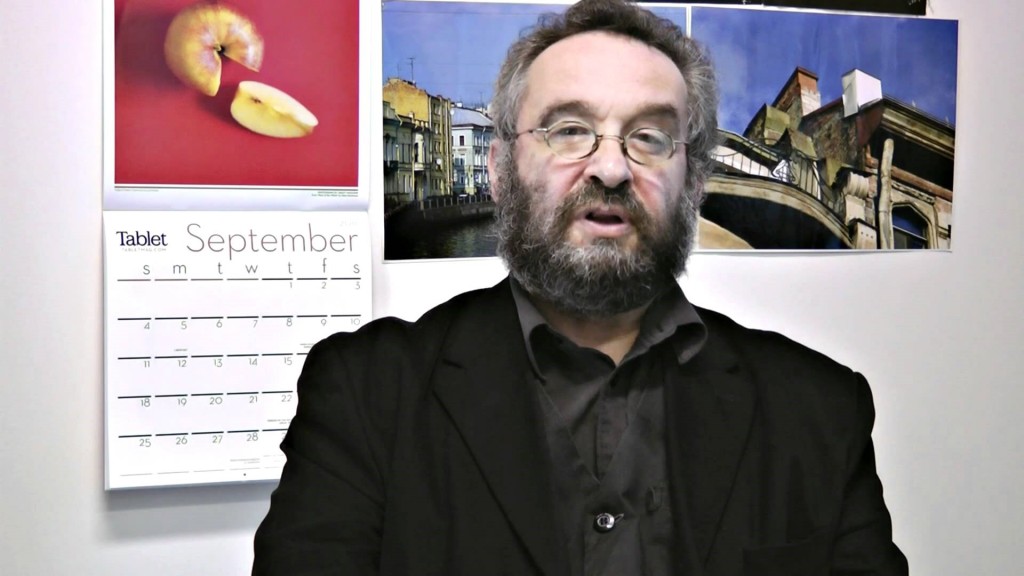
By Mikhail Iossel
Professor of English at Concordia University, Canada
Founding Director at Summer Literary Seminars
The likelihood of Putin’s invading Lithuania or fomenting a Donbass-style counterfeit pro-Russian uprising there, at this point, in my strong opinion, is no higher than that of his attacking Portugal, say, or Ecuador. Regardless of whether he might or might not, in principle, be interested in the insane idea of expanding Russia’s geographic boundaries to those of the former USSR (and I for one do not believe that has ever been his goal), he knows this would be entirely unfeasible, both in near- and long-term historical perspective, for a variety of reasons. It is not going to happen. There will be no restoration of the Soviet Union as a geopolitical entity.
In tacit recognition of that immutable fact, the word combination “the Russian world,” which Putin had brought into political existence ever so triumphantly back in the Spring of 2014, in the immediate wake of the Crimea annexation, has been taken out of circulation completely quite months ago, along with any mentions of the mythological “Novorossiya” (the eight large administrative areas of South-Central and South-Eastern Ukraine which — again, according to the glowing, fever-minded post-Crimean Putin — supposedly, as per some unverifiable historical sources, used to belong to pre-historic, pre-Russian Russia thousands of years ago).
Putin finds himself at this point in a terrible bind of his own making. The simple truth of the matter is this: Russia’s economy is in a shambles, and in a free-fall. Its decline started at least three years ago, prior to Putin’s escapades on the international arena, and subsequently was further exacerbated to a great degree by the drastic slump in oil prices and, of course, the imposition of the Western sanctions against Russia (and, in a remarkable development of breathtaking inanity, along the lines of cutting off one’s nose to spite one’s face, Russia’s reflexive imposition of “food” sanctions against… itself). Simply put, Putin just cannot afford any more large-scale military ventures abroad, if only on purely fiscal grounds. Additionally, he knows now he wouldn’t be able to get away with anything minimally extracurricular there anymore. Having failed to blackmail the West into submissive torpor by indicating his supposed willingness to use Russia’s tactical nuclear weapons in Europe — in effect, attempting to call the West’s bluff thusly: “In Russia, we don’t value our own lives as much as you do, the enfeebled westerns. Well, America and Germany and all the rest of you westerners, are you sure you’d be willing to sacrifice the lives of your young men and women in uniform for the sake of Daugavpils, say, or Narva or Klaipeda?” — he knows full-well now, even based on the immediate subsequent deployment of the US tactical and airforce detachments in the former Soviet Baltic republics, that yes, indeed, NATO most certainly will abide unwaveringly by its charter on common defence, chapter and verse, and will perceive an attack on any one of its members as an aggression against every one of them at once. Putin’s attempt at intimidating the West, thus, ended up in the form of an egg on his own face. And he knows now, too, and only too well, that the West will not hesitate to impose the further, considerably more stringent still, sanctions against his regime, in the case of any slightest display of aggressiveness on his part in Ukraine, let alone anyplace else in Europe. Russia’s economy will not be able to withstand any amount of further punishment, no matter how minute. Such previously discussed steps as, for instance, banning Russian financial institutions from using the SWIFT interbank payment system, would quite literally bring down to its knees the country’s entire financial system.
It is, then, for a combination of above-state reasons that Putin has been hamstrung in South-Eastern Ukraine, forced to freeze the active phase of the conflict here, initiate the removal of Russian troops from the former battle zone, “disown” (or in their view, betray) the local pro-Russian separatists he himself had created and trained and armed to the teeth; and hence, his, ever more insistent efforts to force Ukraine into “taking back” that, thoroughly and pointlessly devastated, war-ravaged region of defunct coal mines and pauperized, angry and confused populace.
It is important to understand that Putin has suffered a devastating, humiliating defeat in Ukraine. None of his overarching original goals for tat endeavour have been achieved. There will be no mythical “Novorossiya,” and therefore no land corridor to the annexed Crimea, which is cut off from Russia geographically and, representing a sort of metaphorical piece of luggage without a handle, already is suffering dramatic price increases and conspicuous rise in the levels of corruption. There will be no wholesale destruction of Ukraine as a form of punishment for her having rejected the corrupt, criminal, authoritarian, dead-end ways of Putin’s fascist regime in Russia. Ukraine is drifting away from Russia, moving decisively in the European direction; and despite the massive current difficulties of economic and structural nature, it will be fine in the end, it will be all right, it will survive, because the western world is on her side, and it will help to pull her through the current hardship. Russia, on the other hand, is getting progressively weaker, having enmeshed itself in a hopeless new “cold war” with the West. Putin’s vanity, his burning desire to be perceived as an equal to the western leaders (and first and foremost among them, the US President) and, impossibly enough, to have the clock of history turned back to the Yalta and Potsdam agreements era, with the world divided between the US and Russian spheres of influence — they have gotten the best of him. There is not a single conceivable scenario whereby Russia could come out the winner in this present confrontation with the West, whose economy collectively is 15 or 20 times stronger than that of Russia, and whose combined military power is vastly superior to Russia’s, as well.
What is Putin to do? His overriding goal in life, at this point, it appears, is to end up dying in his own bed. And since Putin has been proclaimed by his propagandists synonymous with Russia, in terms of his physical and spiritual existence, the above goal has also become Russia’s ultimate strategic goal, for now. He has lost in Ukraine, but he cannot admit that fact publicly. The one hundred million-strong army of Russian TV-viewers, having been subject over the past year to the most extraordinarily intense and toxic media propaganda campaign in human history, continues to be in a highly chauvinistic, belligerent, beclouded state of mind. It wants to keep being assured that Russia is kicking the West’s butt everywhere in the world. Putin, thus, needs to have his populace’s attention switched away from the failure of his Ukrainian campaign, as well as from the catastrophic state of the country’s economy (food prices rising exponentially from week to week, inflation going through the roof, people’s incomes shrinking faster that the portrait of Dorian Grey at its fastest, and millions of people falling into extreme poverty over the last year alone). Enter Syria — Russia’s last ally in the Middle East. Enter the show of Russia’s reclaiming its lost status of a global superpower: “We’re back in the Middle East! The West can no longer keep ignoring us! We’re a superpower again!” It is a virtual war, largely, one made for TV: with no Russian boots on the ground and the Russian planes bombing away at will at random targets, with no perceptible results. Now it’s Syria around the clock on Russian TV-screens — and barely a peep about Ukraine.
It is not difficult to predict the way this latest, Syrian campaign is going to turn out for Putin. Virtual wars have progressively shorter shelf lives in modern world. And then what? Then there will be something else — but already inside Russia, where the new, weaker edition of Stalin-era terror is already being introduced. Putin is desperate. What we are witnessing now is his political agony.
- Bookmark :
- Digg
- del.icio.us
- Stumbleupon
- Redit it
Are all Lithuanian energy problems now resolved?
- Posted by - (6) Comment

By Dr. Stasys Backaitis,
P.E., CSMP, SAE Fellow Member of Central and Eastern European Coalition, Washington, D.C., USA
Lithuania’s Energy Timeline – from total dependence to independence
Lithuania as a country does not have significant energy resources. Energy consuming infrastructure after WWII was small and totally supported by energy imports from Russia.
First nuclear reactor begins power generation at Ignalina in 1983, the second reactor in 1987. Ignalina generates enough electricity to cover Lithuania’s needs and about 50%.for export..As,
The Klaipėda Sea terminal begins Russia’s oil export operations in 1959 and imports in 1994.
Mazeikiu Nafta (current ORLEAN Lietuva) begins operation of
Russia supplies oil to the refinery via Druzhba pipeline since 1980. Stops delivery in 2006.
Lithuania builds
Upon joining EU in 2004, Lithuania is seeking independence from Russia energy sources. Up to 2014, Lithuania imports all gas and most oil and electricity needs from Russia.
In 2014, Lithuania completes construction of LNG terminal at Klaipeda and begins LNG import
In 2018/9, Lithuania and Poland plan to complete pipeline connection for LNG transmission.
By
In late 2016, a 1000 MW electric powerline (LITPOL-Link) will connect Lithuania with Poland.
LNG and electricity interconnections with EU assures energy independence from Russia.
LNG and electricity imports allow energy sharing with Latvia and Estonia.
Some typical relevant picture montage:
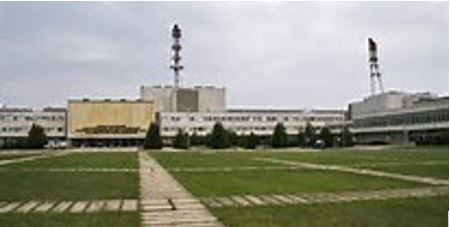
Ignalina – closed nuclear power plant in 2009
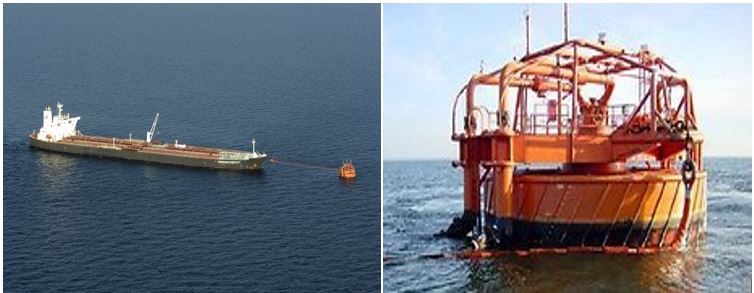
Oil transfer station in the Baltic sea at Butinge Oil transfer receptacle
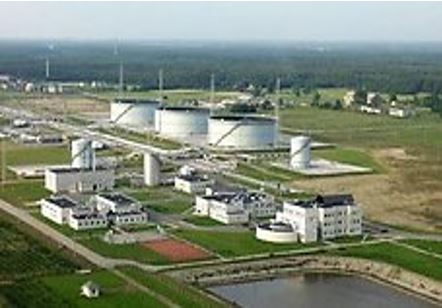
Oil Storage station at Butinge
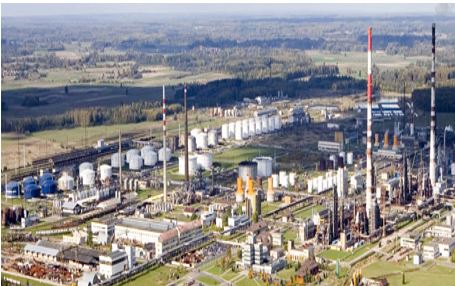
Oil Refinery – Mazeikiu Nafta (Orlean Lietuva)
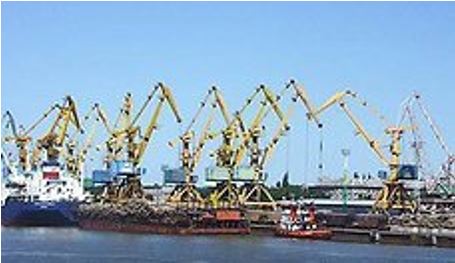
Klaipeda – ship to shore oil transfer terminal
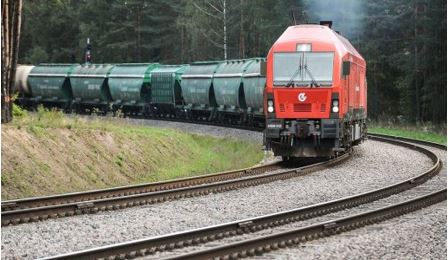
Oil transport from Klaipeda Nafta to Belarus
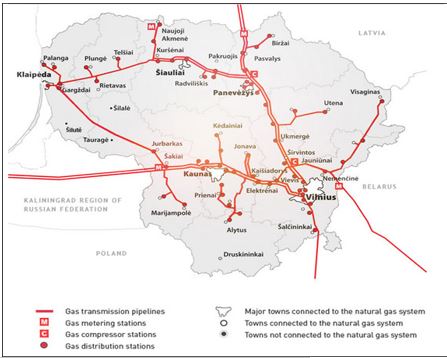
Current gas pipeline network in Lithuania
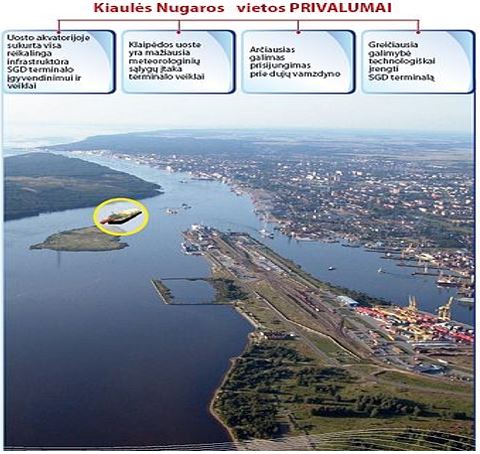
LNG island terminal (yellow circle) just east of inlet to port of Klaipeda
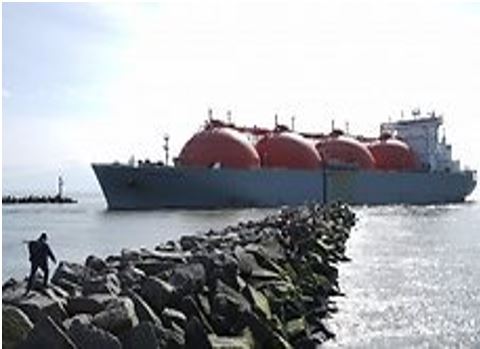
LNG carrying tanker entering the port of Klaipeda inlet
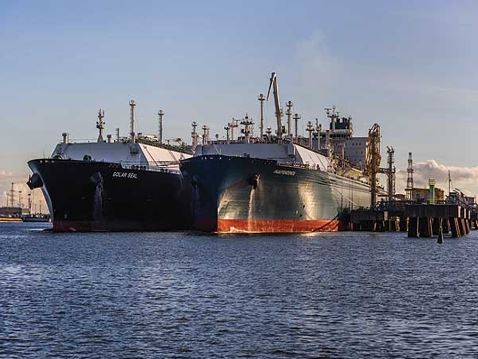
LNG is transferred from tanker to a stationary floating terminal
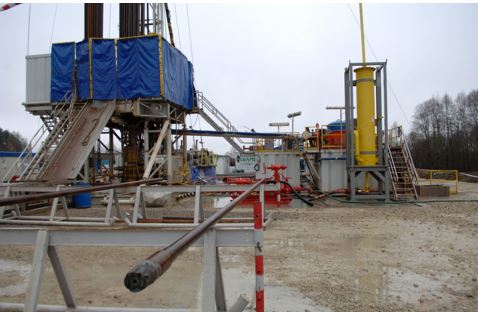
Preparing a 500 mln cu.m. underground LNG
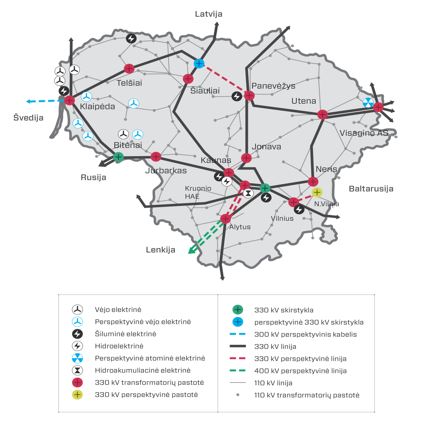
Locations of Lithuania’s electricity producers and the distribution grid
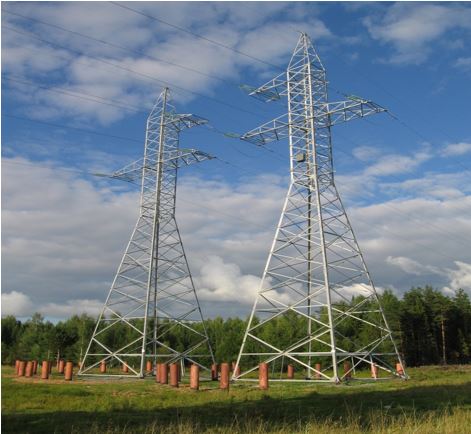
High voltage transmission line towers
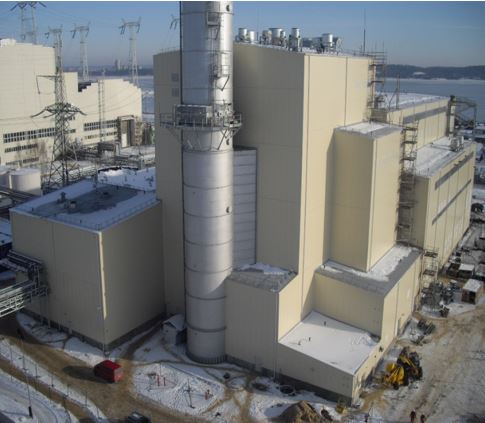
Elektrenai, Lithuania’s main electrical power plant, Four gas and/or oil powered blocks 300 MW/ea., one 455 MW combined cycle block
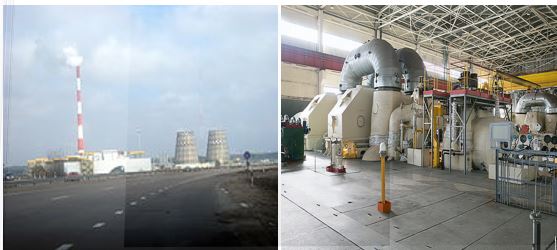
Vilnius Energy – combined heat (603 MW) and electric (360MW) power plant
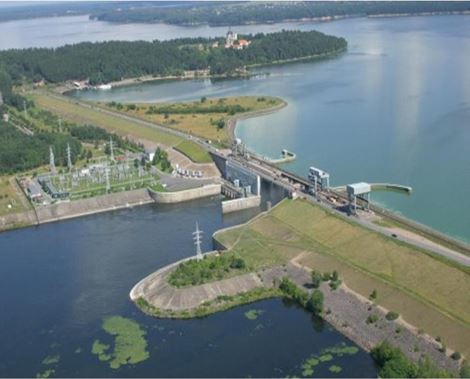
Kaunas hydroelectric 110MW power plant
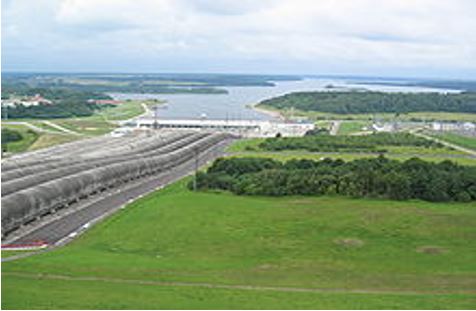
Kruonis Pumped Storage Hydroelectric 900MW powerplant
Lithuania’s current wind power generation in 17 parks - 282 MW
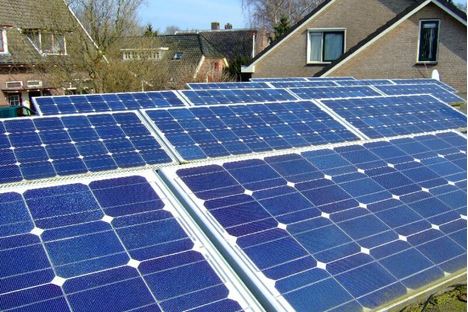
Solar Energy Generating Systems delivered in 2013 61 MW of electric power
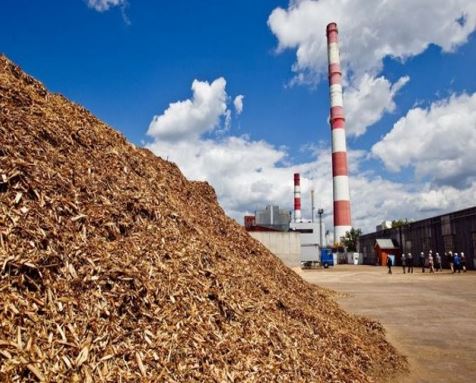
Heat and electricity generation with biofuels and biomass produced nearly 23% of Lithuania’s consumed energy. It is still rapidly expanding
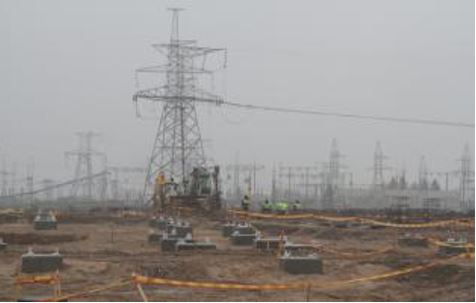
Electrical „LitPol Link” in rapid construction in Lithuania and Poland
- Bookmark :
- Digg
- del.icio.us
- Stumbleupon
- Redit it
Have Lithuanian ties across the Baltic Sea become stronger in recent years?
- Posted by - (0) Comment

By Eitvydas Bajarūnas
Lithuanian Ambassador to Sweden
My answer to affirmative “yes”. Yes, Lithuanian ties across the Baltic Sea become as never before solid in recent years. For me the biggest achievement of Lithuania in the Baltic Sea region during recent years is boosting Baltic and Nordic ties. And not because of mere accident – Nordic direction was Lithuania’s strategic choice.
The two decades that have passed since regaining Lithuania‘s independence can be described as a “building boom”. From the wreckage of a captive Soviet republic, a generation of Lithuanians have built a modern European state, and are now helping construct a Nordic-Baltic community replete with institutions intended to promote political coordination and foster a trans-Baltic regional identity. Indeed, a “Nordic-Baltic community” – I will explain later in my text the meaning of this catch-phrase.
Since the restoration of Lithuania’s independence 25 years ago, we have continuously felt a strong support from Nordic countries. Nordics in particular were among the countries supporting Lithuania’s and Baltic States’ striving towards independence. Take example of Iceland, country which recognized Lithuania in February of 1991, well in advance of other countries. Yet another example – Swedish Ambassador was the first ambassador accredited to Lithuania in 1991. The other countries followed suit. When we restored our statehood, Nordic Countries became champions in promoting Baltic integration into Euro-Atlantic institutions. To large degree thanks Nordic Countries, massive transformations occurred in Lithuania since then, Lithuania became fully-fledged member of the EU and NATO, and we joined the Eurozone on 1 January 2015.
Lithuania took advantage of it very successfully because we soon realized that the assistance and support of the Nordic Countries could help us to play more a significant role in the European and transatlantic space as well as help us solve problems that were urgent for us and the entire region. Nordics, especially – Sweden, became the largest investors in Lithuania, not to mention their financial support for our states’ civil societies, democracy and other important processes which were particularly important to us as developing states that had restored their independence and statehood. And this is quite natural: Nordic and Baltic are united by common values, interests and clear goals. We cherish our freedom but we also care a great deal about everyone’s right to be free.
Several public opinion polls pointed out that Lithuanians believe Lithuania should be associated with the region of Northern Europe, and not with Eastern Europe. Northern orientation dominated in the cases of Estonia and Latvia as well. Orientation towards the North was even proposed by a foreign company that consulted the Government of Lithuania some years ago on image creation issues: in terms of economy Lithuania had rather be associated with the stable, advanced, socially responsible Nordic Countries than the post-soviet space.
- Bookmark :
- Digg
- del.icio.us
- Stumbleupon
- Redit it
- Posted by - (7) Comment
As long as VilNews exists,
|
DR. IRENA VEISAITE, CHAIRWOMAN OF THE VILNEWS HONORARY COUNCIL
|
Professor Irena Veisaite, Chairwoman of our Honorary Council, has asked us to convey her heartfelt greetings to the other Council Members and to all readers of VilNews.
“My love and best wishes to all. As long as VilNews exists, there is hope for the future,” she writes. Irena Veisaite means very much for our publication, and we do hereby thank her for the support and wise commitment she always shows. You can read our interview with her HERE. |
- Bookmark :
- Digg
- del.icio.us
- Stumbleupon
- Redit it
- Posted by - (7) Comment
VilNews is back!
Our publication VilNews has been inactive over the past two years. But here we are again, ready with a fresh new issue. We wish old and new readers worldwide warmly welcome!
VilNews is no normal media, more a communication platform where our readers are invited to give feedback and also write comment articles. I hope you all will enjoy reading/seeing the material we will be publishing!
“New” VilNews consists of 18 sections that you can immerse yourself into by clicking on the link buttons at the top of each page.
If “old” VilNews had been printed on paper, it would become a book of more than 7,000 pages of totally unique reading material about historical and contemporary Lithuania. This huge material is still available. All old and new articles are sorted by topics, in our 18 sections.
I wish you some good reading, and please do not hesitate to contact us!
Aage Myhre
Editor-in-Chief
aage.myhre@VilNews.com
- Bookmark :
- Digg
- del.icio.us
- Stumbleupon
- Redit it
- Posted by - (0) Comment
Writer Yves Plasseraud: My book about Irena Veisaite
Her intelligence and
strength struck me
I have known Irena some 25 years ago within the frame of her Soros Foundation activities, but it was only a few years ago that I began thinking about writing her biography. At the beginning, with Irena our conversations were more or less technical, about Human Rights, minorities, Jewish issues and Lithuanian Jewish relations, in which we were both involved.
The intelligence and the strength of her convictions rapidly struck me.
- Bookmark :
- Digg
- del.icio.us
- Stumbleupon
- Redit it
VilNews e-magazine is published in Vilnius, Lithuania. Editor-in-Chief: Mr. Aage Myhre. Inquires to the editors: editor@VilNews.com.
Code of Ethics: See Section 2 – about VilNews. VilNews is not responsible for content on external links/web pages.
HOW TO ADVERTISE IN VILNEWS.
All content is copyrighted © 2011. UAB ‘VilNews’.

 Click on the buttons to open and read each of VilNews' 18 sub-sections
Click on the buttons to open and read each of VilNews' 18 sub-sections 

















.jpg)



